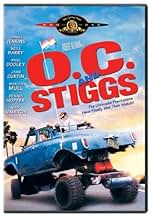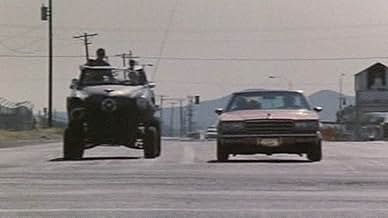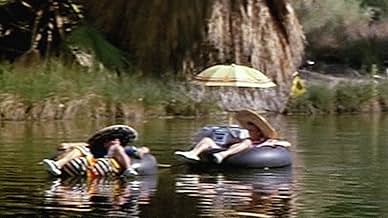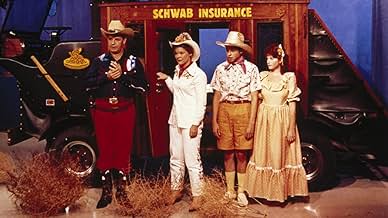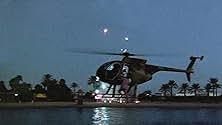Füge eine Handlung in deiner Sprache hinzuO.C. and Stiggs aren't your average unhappy teenagers. They not only despise their suburban surroundings, they plot against them. They seek revenge against the middle-class Schwab family, wh... Alles lesenO.C. and Stiggs aren't your average unhappy teenagers. They not only despise their suburban surroundings, they plot against them. They seek revenge against the middle-class Schwab family, who embody all they detest: the middle class.O.C. and Stiggs aren't your average unhappy teenagers. They not only despise their suburban surroundings, they plot against them. They seek revenge against the middle-class Schwab family, who embody all they detest: the middle class.
- O.C.
- (as Daniel H. Jenkins)
- Lenore Schwab
- (as Laura Urstein)
- Jefferson Washington
- (as Greg Wangler)
Empfohlene Bewertungen
The very nominal plot has something to do with two adolescents (the O.C. and Stiggs of the title) spending one summer terrorizing an affluent, middle class family because the patriarch (played with just the right amount of buffoonery by Paul Dooley), head of an insurance company, has denied insurance for O.C.'s grandfather (played uproariously by Ray Walston). But let me stress the word "nominal." This narrative loosely holds together what can otherwise only be described as controlled chaos. In typical Altman fashion, the film is an assemblage of barely choreographed scenes in which actors wander around ad-libbing to their hearts' content. This is not an insult. This style has resulted in some dreadful bombs for Altman, but it's also been responsible for some of his inspired classics. "O.C. and Stiggs" is nowhere near the latter, but it's certainly not the former either.
Altman said in interviews that he intended "O.C. and Stiggs" as a satire of all of those naughty "boys behaving badly" comedies popular in the 1980s. I don't know that it's so much a satire of those films as it is on people in general. It's full of a sneering disdain for a sort of vapid, bourgeois lifestyle that rears its head in much of Altman's work. Scottsdale, Arizona is depicted as a bland land of lawn ornaments, plastic furniture and man-made nature. We don't learn much about O.C. and Stiggs, and they're not even necessarily that likable, but neither are the Schwabbs, the family they torment, and anyway Altman doesn't really ask us to root for anyone but rather just enjoy the silliness. The funniest thing about the film is that the Schwabbs seem to be completely unaware that they're being tormented and instead wander around in a self-absorbed daze.
The rest of the cast includes Jane Curtin, as the boozy matriarch; Martin Mull, as a designer of African fashions; Cynthia Nixon, as a love interest; Jon Cryer, as a dweeb; and best of all, Dennis Hopper, reprising his role from "Apocalypse Now," and who features significantly in the film's climax, a shootout in the Schwabbs' bomb shelter.
It would appear that time has been kind to this utterly dismissed film from the mid-1980s, and you could do much worse from Robert Altman's canon alone, let alone from other films in the same genre.
Grade: B
The movie is not entirely worthless, though. Occasional gems from the story survive in Altman's adaptation, and Altman's trademarked style is as evident as ever. Each scene is almost littered with celebrities, and there are plenty of layers of dialogue that no other contemporary director pulls off as well as Altman.
Phoenicians can entertain themselves during lulls in the movie by spotting local landmarks. Overall, you could do worse on a dollar rental, but you really should read the story to appreciate the little bits that survived in the film.
I was glad it wasn't just some assembly-line thing. It is an Altman movie, to the bone, so loose and free that you have to watch moment to moment because there isn't anything CLOSE to a plot here. It's just a semblance of vignettes around what OC and Stiggs did on their summer break (not their real names, and as OC says, one of my big laughs, is that "Call me OC, it sounds more ridiculous"). Make a wild car that is $100 off the lot and can be decked out to look like a monster-truck- Studebaker? Check. Bring a machine gun as a wedding present for a very unsatisfactory wedding? Check. Make friends and give out t-shirts from the Schwab insurance company to Melvin Van Peebles? Oh hell yeah a check. How about a trip to Mexico to snag an African band to later crash a theater production on its opening night? Uh... hey, it IS a National Lampoon movie.... sorta, not really, whatever.
I was fascinated by OC and Stiggs, no question there. Sometimes I was laughing, more for the little beats of oddball behavior that Altman was always known for sprinkling in. Ray Walston as the grandfather, while no more or less one note than any of the other supporting (or lead?) characters, is maybe the funniest most consistently, rambling about extreme acts of violence in stories and making outrageous omelette's and drink concoctions that he correctly predicts make one more prone to sex. And while he's not as funny as I'd hoped, Dennis Hopper also has a fun appearance playing his Photo-Journalist from Apocalypse Now - that is, if the Photo-Journalist ended up having lots of guns, ammo, and marijuana to grow out in the fields, uh, somewhere.
The whole project, from some of the casting (hey, Jane Curtain and, uh, future stars Cynthia Nixon and Jon Cryer) to how bizarre some of the set pieces get (skinny dipping again in the Schwab's pool? Hey, there's a tiki backyard next door!), is like a big stunt on Altman's part. And why not? His career was full of them, from doing a shaggy-dog take on the Long Goodbye to his madcap take on Popeye. But the main characters are so obnoxious that the power of the satire just became lost, and I wasn't sure if the line not simply got blurred between doing an actual teen comedy and a satire of it but that the line was screwed altogether. Over time the film seems to have gotten a small cult - maybe apologists, maybe people who genuinely like it after it unfortunately (or maybe rightfully) bombed after being shelved for two years - but it still doesn't make it top shelf work from this director. The style is just so all over the place that maybe, at best, it could work as a wild-card party movie, like throw it on, dip in and out, get laughs where they suddenly, outrageously, pop up, and skip over some of the lesser points. C+
Wusstest du schon
- WissenswertesPost-production was finished in 1984, but the film wasn't released until three years later.
- PatzerWhen the helicopter lands in Schawb's yard, Goon's arm can be seen hiding behind the seats. The pilot just leans over so that Goon can jump out from behind and look as if he was the pilot.
- Zitate
Mark Stiggs: [specifying the Gila Monster car to Ms Bunny] OK, Ms. Bunny! Number 1, we want zero miles to the gallon.
Oliver Cromwell 'O.C.' Ogilvie: Right. No MPGs. It has to be a vulgarlay inefficient mode of trasnportation.
Mark Stiggs: Loud, real loud. It has to generate a terrifyingly seismic field of noise. If we could combine really loud noise with the ugliness of poverty, we'd have the ideal car.
Mark Stiggs: ...making people think that you're poor, so they know you've got nothing to loose if they crash into your car....
Mark Stiggs: Here's a list of places I want this car to be totally unwelcome. Number one: funerals. Number two: affairs of state, you know, real formal ones...ones with...chamber music. Number three: wet golf greens. Number four: the acropolis.
Oliver Cromwell 'O.C.' Ogilvie: Ah, yes. Driving this car right in the acropolis should be completely horrifying to every civilized guy on earth.
- VerbindungenFeatured in Altman (2014)
- SoundtracksMo Ti Mo
(song title uncredited)
Written by King Sunny Ade
Performed by King Sunny Ade and his African Beats
Special music and appearance by King Sunny Ade and his AFRICAN BEATS
Courtesy of Island Records, Ltd.
Top-Auswahl
- How long is O.C. and Stiggs?Powered by Alexa
Details
Box Office
- Budget
- 7.000.000 $ (geschätzt)
- Bruttoertrag in den USA und Kanada
- 29.815 $
- Eröffnungswochenende in den USA und in Kanada
- 6.273 $
- 12. Juli 1987
- Weltweiter Bruttoertrag
- 29.815 $
- Laufzeit1 Stunde 49 Minuten
- Sound-Mix
- Seitenverhältnis
- 2.35 : 1
Zu dieser Seite beitragen


